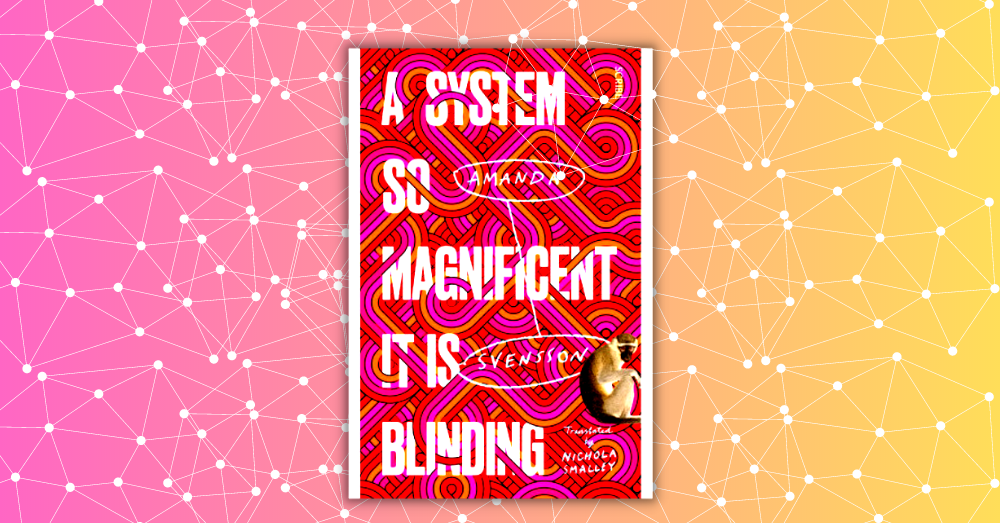“Kathleen always said the blood in your veins could either be fire, water or earth. Matilda’s was always almost fire. Clara’s was water. Sebastian’s earth.” “…I thought it before I even knew that you fit together in some way, like dark and light. Shadow siblings. That’s what I thought.”
Amanda Svensson’s 527-pager ‘A System So Magnificent it is Blinding’, translated by the brilliant Nicola Smalley, is the story of Sebastian, Matilda and Clara. It is a story of love, loss, survival, and by extension, existentialism at its core.
Sebastian works for a mysterious scientific organisation in London; Clara has travelled to Easter Island to join a doomsday cult after getting sacked from her job; Matilda is in Sweden, practising being a partner and, more importantly, a stepmother. It is as much their story as it is the story of their individual selves and the system that binds and blinds them together: family. Can I just take a moment to jump in between my own thoughts and share how excellent I find this lens of viewing a family as a system?
Back to their story. The triplets’ father, whom they’ve hardly been in touch with, has gone missing. And their mother tells them a secret that will change their lives, and their fractured family, forever.
Prose That Cuts Like Butter
I love this book to bits, and I do not know how to begin talking about something you love. It is some of the most gorgeous prose that cuts like butter. It is so nonchalantly, willingly dark. The book takes life so seriously, all the while making its central characters take a jab at it with a peculiar detachment. A novel largely concerned with dysfunction is rather easy about its dysfunction. “But that’s life, I guess – dramatic, dirty and sometimes dreadfully chaotic.”
I irrevocably love the character writing in this book – so able, clear, and acute. I’ve not seen a lot of authors have this intimacy and privy to their characters. I found myself rooting for them three from the beginning, and that trust and awe feels sacred to me as a reader. The book is plush with themes of mental health, climate anxieties and dystopia, control, free will, forgiveness, human connection and more.
I especially love how the book explores our weird pride and superiority as a species and does so with immense grounding and simplicity. “You know, we’re can-do people. Which is why we’ve managed to fuck up so much of the world in such a short time.”
The Art Of The Last Sentence
Along with being one of the few authors who have such an incredible hold over a ‘moment’, Amanda is also a master of what I’ll call here ‘the last sentence’. I don’t know if a word for it exists, but it felt pertinent to mention it here, given how much I loved that about the book. I’ve read very, very few books where the author’s strength, involvement and control of the narrative is so strong at the end of every chapter.
From a systemic lens, the book starkly unroots the structure of what makes (and breaks) a family and the daunting magnificence of the institution. “There’s a system in the madness; that’s all I’m saying. A system so magnificent it blinds us.” It is a remarkable piece of writing that lays bare ultimate truths about human behaviour with biting honesty; that is so deeply moving and emotional but also wildly strange and detached.
Lastly, I love how this book constantly challenged my relationship with it – as a reader. It fed my curiosity and jolted me both. I also think that the way the book began and ended was very similar – loose, (good) weird and full of potential. Came a full circle, you could say? And for the master of the last sentence, the ending is not particularly simple or direct.
And in that, it does justice to its core inquiry, which Michael Callahan writes about in his New York Times review: Are our lives simply random intersections of space and time, or are they part of a grand master plan of the universe, where we are all but cosmic marionettes and nothing is coincidence? I’ll leave you with the simplest but most profound lesson I’ve lived with, and that the book offers. “Never stop measuring the world, Sebastian.” “Nothing goes under, the world is a wonder.”
This book has been published by Scribe Publications.
If you like what I wrote, follow me on YKA and on my bookstagram where I talk a lot more about books, reading and all things words.
